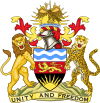The Malawi Portal
Malawi (/məˈlɑːwi/; lit. 'flames' in Chichewa and Chitumbuka), officially the Republic of Malawi and formerly known as Nyasaland, is a landlocked country in Southeastern Africa. It is bordered by Zambia to the west, Tanzania to the north and northeast, and Mozambique to the east, south and southwest. Malawi spans over 118,484 km2 (45,747 sq mi) and has an estimated population of 19,431,566 (as of January 2021). Malawi's capital and largest city is Lilongwe. Its second-largest is Blantyre, its third-largest is Mzuzu and its fourth-largest is its former capital, Zomba. It was the first capital city of Malawi before being changed to Lilongwe. The part of Africa now known as Malawi was settled around the 10th century by migrating Bantu groups. Centuries later, in 1891, the area was colonised by the British as the British Central African Protectorate, and it was renamed as Nyasaland in 1907. In 1953, it became a protectorate within the semi-independent Federation of Rhodesia and Nyasaland. The Federation was dissolved in 1963. In 1964, the protectorate was ended: Nyasaland became an independent country as a Commonwealth realm under Prime Minister Hastings Banda, and was renamed Malawi. Two years later, Banda became president by converting the country into a one-party presidential republic. Banda was declared President for life in 1971, and Malawi's next few decades of independence were characterized by Banda's highly repressive dictatorship. Following the introduction of a multiparty system in 1993, Banda was defeated in the 1994 general election. Today, Malawi has a democratic, multi-party republic headed by an elected president and has continued to experience peaceful transitions of power. According to the 2024 V-Dem Democracy indices Malawi is ranked 74th electoral democracy worldwide and 11th electoral democracy in Africa. The country's military, the Malawian Defence Force, includes an army, a navy, and an air wing. Malawi's foreign policy is pro-Western. It maintains positive diplomatic relations with most countries, and participates in several international organisations, including the United Nations, the Commonwealth of Nations, the Southern African Development Community (SADC), the Common Market for Eastern and Southern Africa (COMESA), and the African Union (AU). Malawi is one of the world's least-developed countries. The economy is heavily based on agriculture, and it has a largely rural and rapidly growing population. The Malawian government depends heavily on outside aid to meet its development needs, although the amount needed (and the aid offered) has decreased since 2000. The Malawian government faces challenges in its efforts to build and expand the economy, to improve education, healthcare, and environmental protection, and to become financially independent despite widespread unemployment. Since 2005, Malawi has developed several policies that focus on addressing these issues, and the country's outlook appears to be improving: key indicators of progress in the economy, education, and healthcare were seen in 2007 and 2008. Malawi has a low life expectancy and high infant mortality. HIV/AIDS is highly prevalent, which both reduces the labour force and requires increased government expenditures. The country has a diverse population that includes native peoples, Asians, and Europeans. Several languages are spoken, and there is an array of religious beliefs. Although in the past there was a periodic regional conflict fuelled in part by ethnic divisions, by 2008 this internal conflict had considerably diminished, and the idea of identifying with one's Malawian nationality had reemerged. (Full article...) Selected article -
The African Lakes Corporation plc was a British company originally set-up in 1877 by Scottish businessmen to co-operate with Presbyterian missions in what is now Malawi. Despite its original connections with the Free Church of Scotland, it operated its businesses in Africa on a commercial rather than a philanthropic basis. It had political ambitions in the 1880s to control part of Central Africa and engaged in armed conflict with Swahili traders. Its businesses in the colonial era included water transport on the lakes and rivers of Central Africa, wholesale and retail trading including the operation of general stores, labour recruitment, landowning and later an automotive business. The company later diversified, but suffered an economic decline in the 1990s and was liquidated in 2007. One of the last directors of the company kindly bought the records of the company and donated them to Glasgow University Archive Services, where they are still available for research. (Full article...)
Did you know -
CategoriesGeneral images -The following are images from various Malawi-related articles on Wikipedia.
In the newsTopics in MalawiSelected picture Credit: Steve Evans
A child stands before sunrise on the shore of Lake Malawi, Africa's third largest freshwater lake. Associated WikimediaThe following Wikimedia Foundation sister projects provide more on this subject:
Discover Wikipedia using portals | ||||



















































